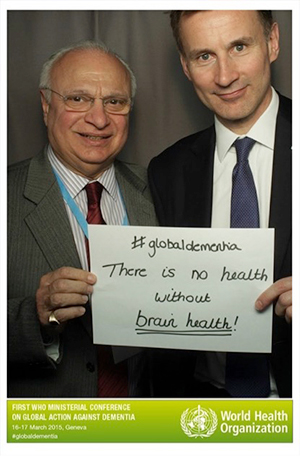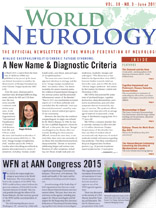
Raad Shakir
In 2006, “Neurological Disorders: Public Health Challenges” was published by the World Health Organization (WHO), with WFN participation1. It is clearly stated: “There is ample evidence that pinpoints neurological disorders as one of the greatest threats to public health.” Dementia was well covered as a major challenge. Rita Levi-Montalcini, Nobel Laureate 1986, wrote the foreword to the book. She stated: “The burden of neurological disorders is reaching a significant proportion of countries with a growing percentage of the population over 65 years old.”
Neurologists across the world deal with various disorders of the brain with vast numbers of individuals affected. For example, every year, 15 million people worldwide suffer a stroke, nearly 6 million die and 5 million are left permanently disabled. Every six seconds a stroke kills someone. Stroke claims more than twice as many lives as AIDS. In fact, stroke continues to be responsible for more deaths annually than those attributed to AIDS, tuberculosis and malaria combined. The burden of stroke now disproportionately affects individuals living in resource-poor countries. Epilepsy affects 50 million people across the world, and seven out of 10 receive no medication. Parkinson’s disease affects 6.3 million; MS affects 2.5 million; and, in addition, neurologists deal with monumental numbers of those complaining of headaches and all other disorders affecting the nervous system. Moreover, the WFN has always applied the principle that there is no health without brain health.

Figure 1. Jeremy Hunt, MP. United Kingdom, Secretary of State for Health (right) and Raad Shakir, President WFN
The first WHO ministerial conference on Global Action Against Dementia was held March 16-17, 2015, in WHO headquarters in Geneva. More than 400 participants attended. The conference was hosted by the WHO and organized by the UK government and the OECD. This is an important milestone in the global action on dementia. One would have thought that neurology would be one of the cornerstones of the global action both in the early detection, confirming a devastating diagnosis, participating in research into diseases of the brain causing dementia and being part of the ambition to have a cure by 2025. It is for all these reasons the World Federation of Neurology representing more than 45,000 neurologists worldwide was delighted to attend and express its views.
Neurological disorders, whether affecting the central or peripheral nervous system, are the major cause of death and disability. The aim of the WFN is to have more training for medical graduates in the field of neurology so that the best possible service can be provided to those afflicted with neurological diseases. However, the inclusion of neurological diseases in the UN NCD declaration of 2011 is only marginal (Item 13bis) in spite of the significance and the devastation caused by diseases of the nervous system2. In the WHO departmental structure, neurology falls under the department of mental health and substance abuse, which seems no longer applicable. The creation of a WHO department of brain health, in order to encompass all forms of dementia, neurodegenerative noncommunicable diseases and the whole of mental health and neurology/neurosurgery is long overdue.
The World Alzheimer Report 20133 rightly emphasized the complexity and difficulties encountered. Perhaps one missing element in its overarching, supporting and research recommendations is that governments should do their best to have specialists in the field of brain diseases involved early in the diagnosis and management of dementia. Moreover, those neurologists with scientific interests should be the ones working in translational clinical research aiming at discovering a disease modifying therapy or ultimately a cure. Just as we cannot underestimate the role of neuroscientists in this endeavor, that of clinicians has to be equally important. Advances in early diagnosis and clinical trials have been galloping over the past few years4.
As for the recent Ministerial Conference on Dementia, U.K. Secretary of State for Health Jeremy Hunt gave an eloquent speech on combating dementia. (See Figure 1.) This is most appropriate as the U.K. was the sponsor of the G8 Declaration on Dementia in December 20135. The establishment of the World Dementia Council and the appointment of the World Dementia Envoy followed.
The two-day deliberations of the topic were most informative, and many expressed the view that a “pandemic” is staring the world in the face. The fact that the numbers will triple from the current 47.5 million by 20506 is frightening, and work needs to be very quick and productive. However, the difficulties of producing new drugs in the field of neurodegenerative disorders were emphasized and the complexities of various causes of dementia are clear to see. The only plausible way forward for research is to combine work on neurodegenerative disorders and look at all possible causes and their pathologies.
The G8 global action against dementia is committed to the “ambition to identify a cure or a disease modifying therapy for dementia by 2025.” The WHO ministerial conference was an extension and a report on the endeavor so far. The WHO and its partner organizations are now moving to confront this most threatening of neurological diseases.
The role of neurologists alongside psychiatrists collaborating with primary care physicians cannot be underestimated. This way, we will create a closely knit group working with patient organizations and governments to try and achieve the G8 ambition to deal with the complexity of all the causes of dementia. Training more young medical graduates in the field of nervous system diseases will create subspecialists who can make an accurate diagnosis and follow the proper pathway in recruiting individuals affected by various neurodegenerative conditions in the correct trials if we are going to achieve the ambition expressed in the G8 declaration. Time and direction are of the essence.
References
- Neurological Disorders: Public Health Challenges. WHO 2006.
- United Nations General Assembly. 2011 High-level Meeting on Prevention and Control of Non-communicable Diseases. http://www.un.org/en/ga/ncdmeeting2011/ (accessed April 24, 2015)
- World Alzheimer Report 2013. Journey of Caring. An Analysis of Long-term Care for Dementia. Published by Alzheimer’s Disease International (ADI) London. September 2013.
- Bateman R. Alzheimer’s Disease and Other Dementia; Advances in 2014. Lancet Neurology; 2015; 14:4-5.
- UK Department of Health. G8 Dementia Summit Declaration. https://www.gov.uk/government/publications/g8-dementia-summit-agreements/g8-dementia-summit-declaration.
- The Lancet Neurology. WHO Takes up the Baton on Dementia. Lancet Neurol 2015; 14:455.Editorial.
